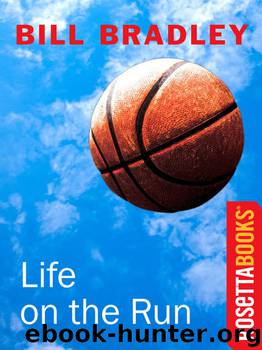Life on the Run by Bill Bradley

Author:Bill Bradley [Bradley, Bill]
Language: eng
Format: epub
ISBN: 978-0-7953-2327-0
Publisher: RosettaBooks
Published: 1976-10-17T04:00:00+00:00
“Promptly after December 31 in each year commencing December 31, 1967, Player shall pay to Club 25 percent of net income (after applicable expenses but before income taxes) received by player during the 12 months ended on such December 31 from any sale of his ancillary basketball rights and services made at any time after date hereof and on or before May 31, 1971. For purposes hereof, income from sale of Player’s ancillary basketball rights and services shall include, but not by way of limitation, all income from endorsements, pictures, public appearances, books, magazine and newspaper articles, and radio and television programs, provided that such income shall be directly related to Player’s activities as a basketball player.”
My negotiations with the Knicks in the Spring of 1967 had reached an impasse until that clause solved all the problems. My attorney, Lawrence Fleisher, and I were sitting in a dark booth in the Oak Room of the Plaza Hotel with Irving Mitchell Felt, Ned Irish, and Bill Jennings, the respective presidents of Madison Square Garden Corp., The New York Knickerbockers, and The New York Rangers. They suggested that they would meet my contract request if I agreed to give 25 percent of my ancillary income to Madison Square Garden. I was 22 years old. I looked at Fleisher, a man I’d known only two months. He was looking at the table. The salad was crisp, the seat soft. “Twenty-five percent of my ancillary rights,” I said. “Well, let me think about it.” We left the hotel, and as we walked toward Sixth Avenue, Fleisher said, “Well what do you think? You ready with the ancillary?”
“Ancillary?” I said, “What are ancillary rights?” I had almost asked at the table but remembered my Abe Lincoln.
“That’s the money from commercials and endorsements,” he said.
“What? I told them I wasn’t going to do any; in fact I insisted on that clause about limiting my publicity appearances.”
“Looks like they don’t believe you,” said Fleisher.
“Looks like I got what I wanted; 25 percent of nothing is nothing,” I said.
Two days later, I signed a four-year contract to play professional basketball.
Agents have told me that by choosing not to do endorsements I lose fifty thousand dollars every year I play professionally. I have had some unusual offers, and a few times I was close to agreeing to a deal, but when it came down to the crunch I said no. Perhaps I wanted no part of an advertising industry which created socially useless personal needs and then sold a product to meet those needs. Maybe I felt that endorsement offers came to me because I was a great white hope for some people and not because I was a great player, and that offended my sensibilities. Chalk one up for America’s two favorites: original sin and guilt. More probably, I wanted to keep my experience of basketball pure, as innocent and unpolluted by commercialism as possible. For many years basketball was my only passion in life. I was immune to the normal profusion of interests that accompany adolescence.
Download
This site does not store any files on its server. We only index and link to content provided by other sites. Please contact the content providers to delete copyright contents if any and email us, we'll remove relevant links or contents immediately.
Waking Up in Heaven: A True Story of Brokenness, Heaven, and Life Again by McVea Crystal & Tresniowski Alex(37773)
Empire of the Sikhs by Patwant Singh(23064)
We're Going to Need More Wine by Gabrielle Union(19027)
Hans Sturm: A Soldier's Odyssey on the Eastern Front by Gordon Williamson(18559)
Leonardo da Vinci by Walter Isaacson(13299)
The Radium Girls by Kate Moore(12007)
Tools of Titans by Timothy Ferriss(8355)
Educated by Tara Westover(8040)
How to Be a Bawse: A Guide to Conquering Life by Lilly Singh(7464)
Permanent Record by Edward Snowden(5821)
The Last Black Unicorn by Tiffany Haddish(5621)
The Rise and Fall of Senator Joe McCarthy by James Cross Giblin(5264)
Promise Me, Dad by Joe Biden(5134)
The Wind in My Hair by Masih Alinejad(5082)
A Higher Loyalty: Truth, Lies, and Leadership by James Comey(4942)
The Crown by Robert Lacey(4794)
The Iron Duke by The Iron Duke(4341)
Joan of Arc by Mary Gordon(4085)
Stalin by Stephen Kotkin(3949)
